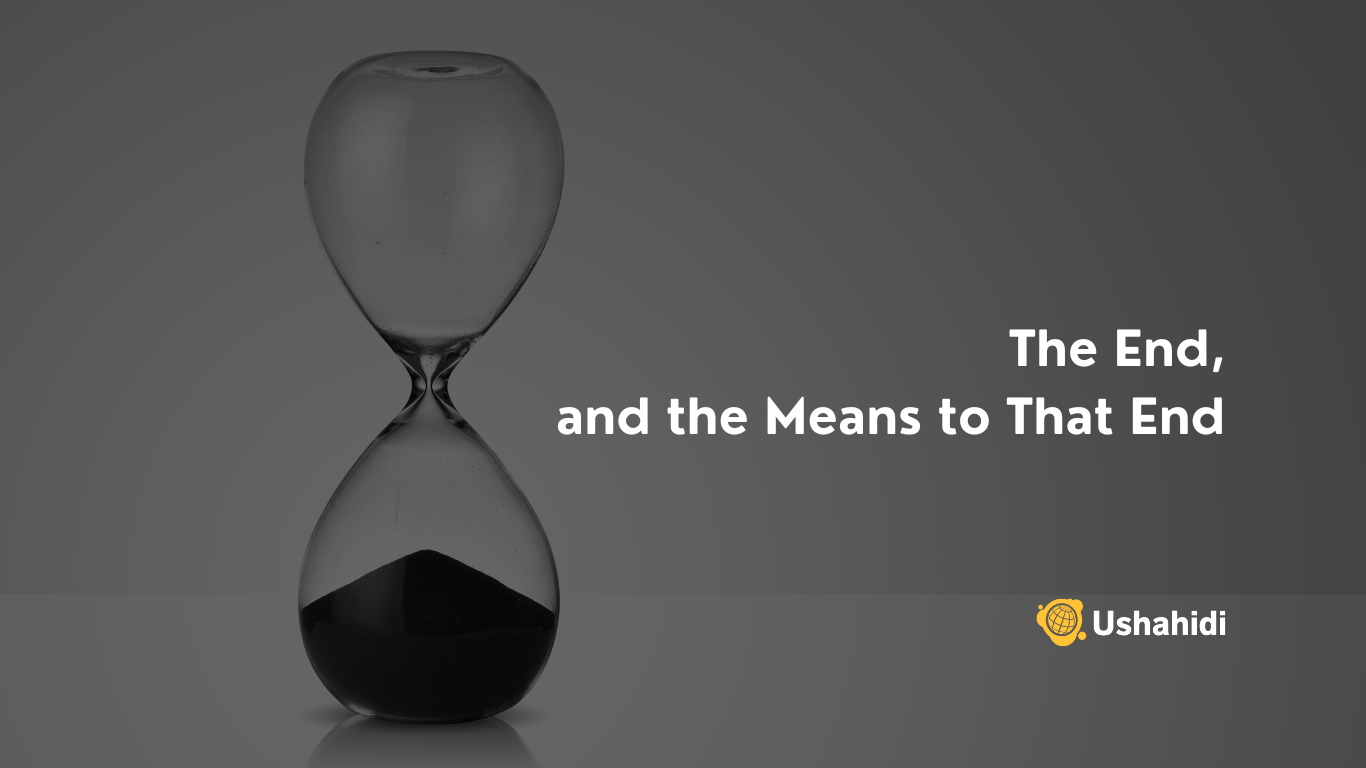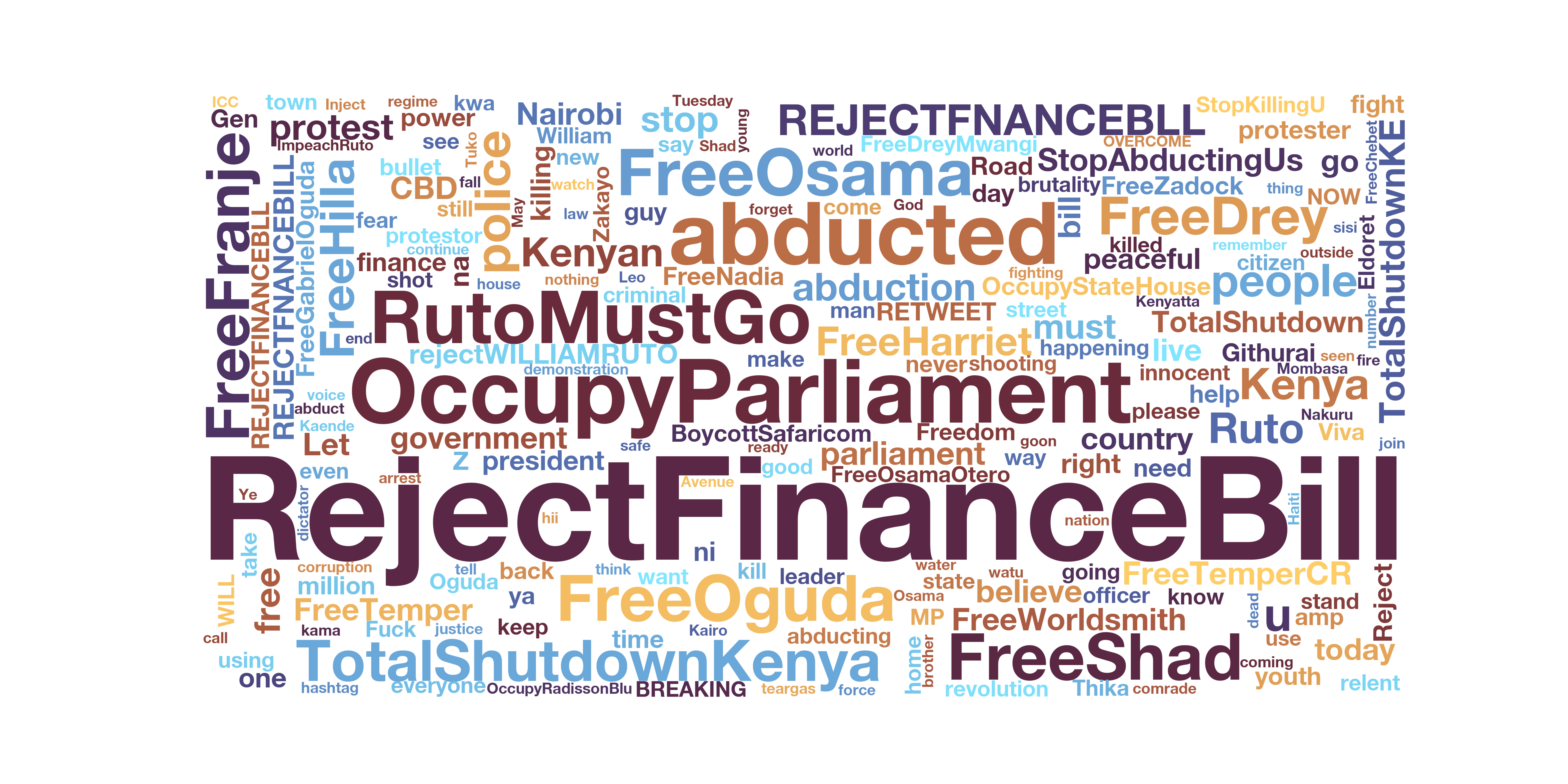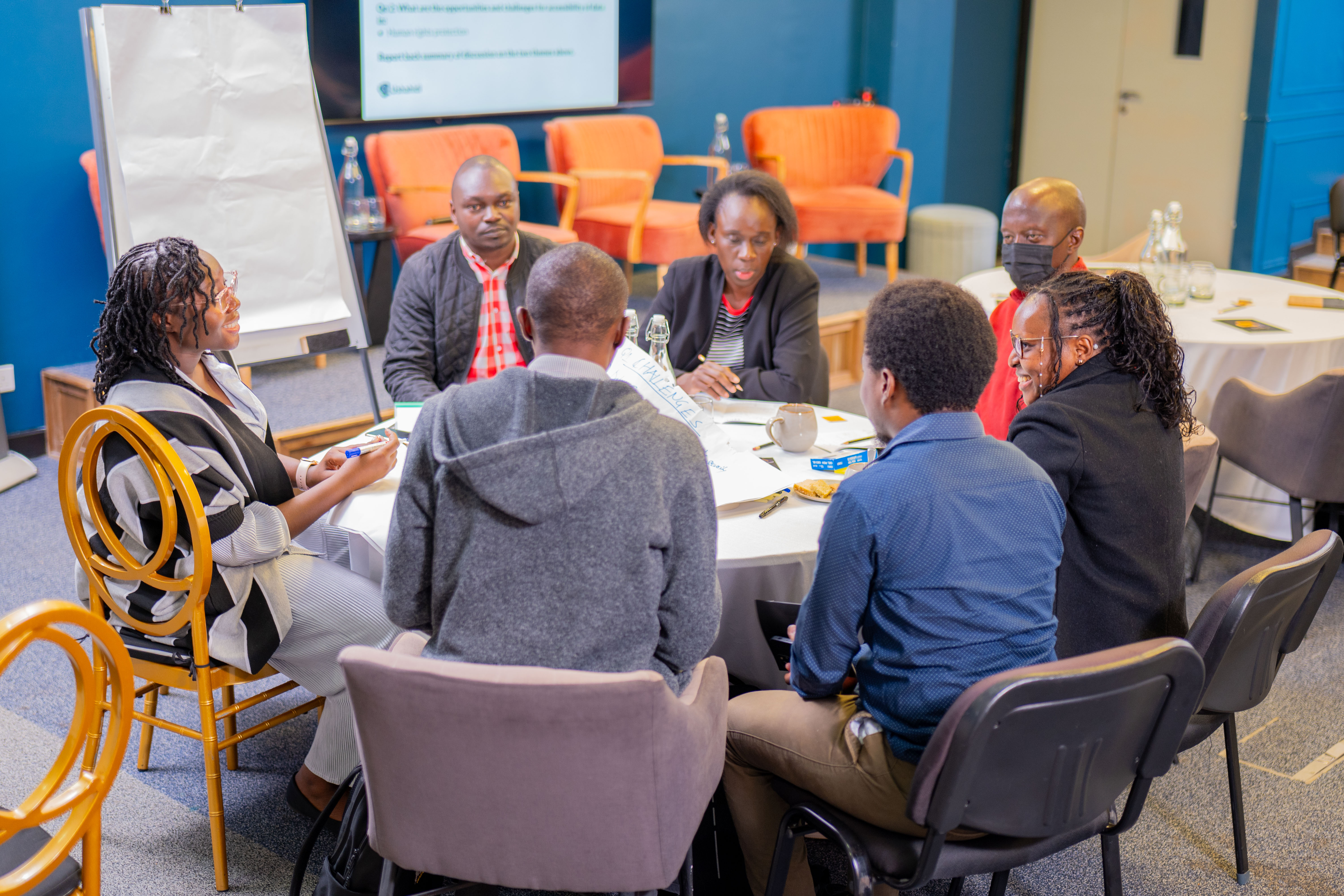The End; and the Means to that End

Nov 12, 2024

One of Ushahidi’s age-old sayings is that “It’s not just about the technology, " which stands true today. And we probably need to remind ourselves of this more now as more emerging technologies take hold within our ecosystem. When every crisis seems to spark a new wave of innovation, it’s easy to lose sight of the real point: technology is not a solution on its own. Technology is a means to an end. Yet, time and time again, the narrative pushed is that tools can change the world, as if software or data alone can replace the human insight, empathy, and lived experience necessary for real progress. It’s easy for us to fall deep into the rabbit holes of building and inadvertently forget the contexts and who we are building for.
In a world plagued by complex geopolitical conflicts, horrific loss of life and human rights violations, diminished trust in democratic institutions, economic hardships, and climate-driven disasters - the need for deep understanding, empathy, and collaboration is even more pressing.
Coming out of this poly-crisis will require collective action powered by knowledge based on inclusive and truthful data.
Technology can catalyze the systemic change we are seeking, facilitating global collaboration, providing access to information, surfacing insights, and designing solutions to the world’s most pressing challenges. It can:-
- Enable the lived experiences of communities often left out of critical conversations to be seen and heard, giving them agency in shaping a sustainable future.
- Improve the efficiency and effectiveness of organizations (small and large alike) that serve disenfranchised communities by enhancing their capacity to gather and consume critical knowledge.
- Empower decision-makers with the insights they need to develop appropriate and inclusive policies.
In September 2023, I shared Ushahidi aspirations to drive long-lasting, meaningful social change by shifting to a more data-centric approach to the work. Here’s how we’ve forged our way down this path.
The End we seek: A renewed purpose
For years, Ushahidi’s energy has been focused on enabling people to gather data at scale to raise the voices of disenfranchised communities. We want to ensure we make those voices count. We want to help people tell better stories from people’s lived experiences to give us a richer understanding of the world’s most pressing challenges.
But how do we reconcile Ushahidi’s deep history of impactful work with these aspirations? How does that influence how we show up for our audiences today?
These were some of the questions we walked into the new year with and spent some time discussing at our annual team retreat in January and with Ushahidi’s new board in March.

We’ve since been able to land on a compelling vision that defines Ushahidi’s renewed purpose:-
Ushahidi exists to ensure that people everywhere can quickly gather data and generate insights that help tackle issues that matter most to them.
We want:
- Decision-makers to have data and insight that help them better support the communities they are committed to serving.
- People rarely heard by decision-makers to share their data in ways that allow them to help each other and/or get the outcomes they want.
- Community-generated datasets to grow into public goods that serve as a resource to improve society.
The Means to the End: A Renewed Product Strategy
With a shared understanding of our purpose, we continued the path of curiosity and asked ourselves critical questions.
Does our current product offering meet the needs of our users today? If not, where are we falling short, and what can we do about it? Is there more that we should be doing? Are we the right people to do it?
We began with an internal reorganization of our technology function, splitting it into Product and Engineering, signaling a deep commitment to executing a product strategy, continuously refining and scaling solutions across diverse geographies and impact sectors.

Under Daniel Odongo’s leadership, we’re defining HOW Ushahidi’s product offering can set us on a path to achieving our renewed goals while navigating an evolving technology landscape. We landed on a three-part strategy that involves building and maintaining tools that meet today’s needs and anticipate tomorrow’s challenges. These tools will:-
- Advance scalable solutions for community-driven data collection, empowering local and disenfranchised voices to shape global conversations.
- Prioritize open access and seamless interoperability of community-generated data, enabling it to integrate with broader datasets for richer, more meaningful insights.
- Harness the power of this data to generate actionable insights that drive informed decisions and long-term impact.
How it’s going
- In partnership with Dataminr, we’ve created new AI models from which we’re already reaping massive benefits in the data management process. These three models support Ushahidi in automatically categorizing, translating, and geolocating data.
- With support from the Data Empowerment Fund, we’re bolstering existing data sources and building the capacity to integrate climate datasets with community-generated data to help users make sense of climate data more effectively.
- With support from the Filecoin Foundation for the Decentralized Web, we launchedan Election Data Archive, leveraging decentralized technology to facilitate secure, transparent, and resilient access to crowdsourced from local communities during the Kenya elections in the recent past.
The beautiful thing about all this progress we’re making isn’t necessarily that Ushahidi is innovating. To my point earlier, it is the potential to influence greater progress and impact.
Moving from data to insight… FASTER
Anyone who’s ever deployed the Ushahidi platform can attest that the data management process takes center stage with significant human effort. In short, we spend so much time picking out the signal from the sea of data, which limits how much insight we can surface promptly for it to be valuable.
The models we’ve developed with Dataminr are already changing that. During the #rejectfinancebill2024 protests in Kenya, we fine-tuned these models. We processed over 2 million tweets collectively within hours, a feat that would have previously taken hundreds of volunteers over several weeks to complete. And that helped us dig deeper into understanding the situation. We spent more time:-
- Drawing comparisons between activities on different protest days.
- Surfacing sentiment analysis and connecting the dots between emotions expressed and significant events.
- And so much more

While this experience also surfaced significant hurdles that the wider AI ecosystem in Africa seeks to address (we will talk about this in a later post), I want you to focus on what this means for the hundreds of thousands of deployers crowdsourcing data on the climate crisis, human rights violations, and election integrity around the world.
Making these models accessible to the broader Ushahidi ecosystem will help these community organizations, activists, civil society groups, and others focus MORE on telling stories with their data rather than managing it - leading them to the deeper understanding they need.
Making community-generated data a valued public good and resource
There’s been value in telling stories of events as they happen. There’s even more value in keeping track of a story and how it changes over time.
Ushahidi has been used to monitor every election in Kenya since 2008. And we’ve done our best to tell a story of each of those electoral cycles through a post-election report. But, we think there’s a big picture story that can be told - one that goes beyond any single election cycle or nation - by analyzing and comparing these unique datasets to each other.
What if the actual value of election data lies not just in tracking outcomes but in uncovering the deeper patterns that shape them? Around the world, electoral integrity is in question, yet we often fail to ask why systems break down or what they are truly meant to uphold. By comparing data across borders, we begin to see that the challenges in one country—voter suppression, misinformation, and eroding trust in democratic institutions—are mirrored elsewhere. The real question is: can we address these systemic issues globally, or will we continue treating each election as an isolated incident rather than part of an ongoing global trend?

Creating this tamper-proof, accessible archive of Kenyan election data is the first step towards identifying the trends in global electoral cycles. The next step would be digging into it; we welcome anyone interested in talking to us. We’re keen to see what we’ll discover.
And then, imagine what this could help surface when we expand this to other areas of social impact.
Moving to Scale: Journey with us to the end!
We’re painfully aware that our ambitions outmatch our capacity to achieve our goals.
- There are lots of open questions we still need to answer.
- What licensing frameworks do we need to use to facilitate the kind of interconnectedness we’re proposing?
- How do we ensure we’re not inadvertently facilitating extraction and no return of value to the communities on whose backs these insights would be generated?
- Are there blindspots we’re not seeing?
- We also have gaps in our internal expertise that we would need to fill to achieve this bold vision.
Here’s an open invitation to build with us and scale Ushahidi’s impact for generations to come:-
- Collaborate with us - especially on tech, data and licensing expertise.
- Volunteer with us - We welcome contributions to our work!
- Fund the work - Join the movement supporting the world’s disenfranchised communities to shape a sustainable future.
We’re always happy to talk, so reach out!!